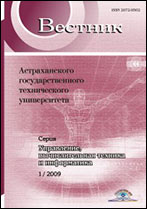|
This article is cited in 2 scientific papers (total in 2 papers)
COMPUTER SOFTWARE AND COMPUTING EQUIPMENT
Application of machine training for forecasting emergencies in heat supply systems
A. A. Akhvaev, V. F. Shurshev
Astrakhan State Technical University, Astrakhan, Russian Federation
Abstract:
The article touches upon the forecasting problem, the solution of which in systems characterized by selecting a traditional algorithm for its description is reduced to machine learning technology. In the context of predicting emergencies in heat supply systems this technology is the most effective. Carrying out the forecast is reduced to the problem of restoring the function in the general content of training by the teacher. Of the available machine learning tools, gradient boosting should be used. It works according to the following principle: at the first iterations the weak algorithms are used, then there increases the ensemble by gradual improvements of those data sections where the previous models have not been finalized. But when constructing the next simple model, it is built not just on reweighted observations, but in such a way as to better approximate the overall gradient of the objective function. Gradient boosting is one of the effective forecasting algorithms and the accuracy of the forecast depends on the correct input data (training sample). The subject area under study, namely the study of emergency situations on heating networks, has sufficient accumulated data to use boosting as the main tool for forecasting.
Keywords:
machine learning, boosting, forecasting, monitoring, loss function.
Received: 23.04.2020
Citation:
A. A. Akhvaev, V. F. Shurshev, “Application of machine training for forecasting emergencies in heat supply systems”, Vestn. Astrakhan State Technical Univ. Ser. Management, Computer Sciences and Informatics, 2020, no. 3, 74–81
Linking options:
https://www.mathnet.ru/eng/vagtu638 https://www.mathnet.ru/eng/vagtu/y2020/i3/p74
|

| Statistics & downloads: |
| Abstract page: | 139 | | Full-text PDF : | 199 | | References: | 25 |
|




 Contact us:
Contact us: Terms of Use
Terms of Use
 Registration to the website
Registration to the website Logotypes
Logotypes








 Citation in format
Citation in format 
